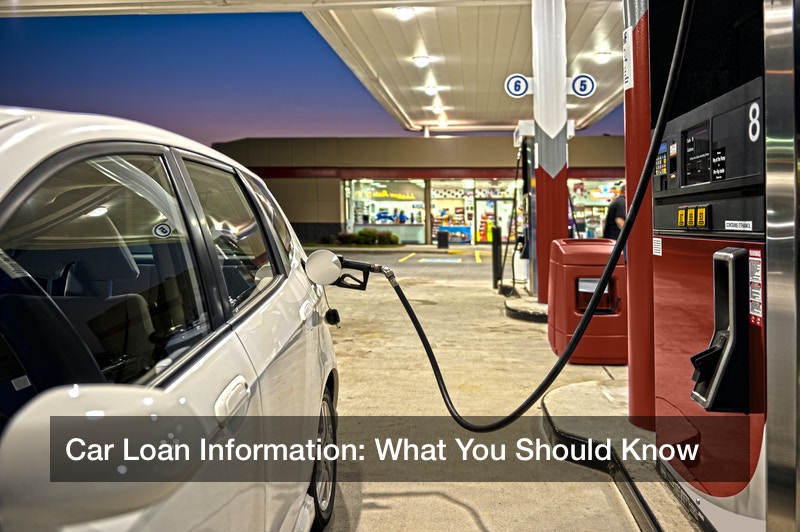
Most Americans buying a new car take out a car loan. In fact, auto loan debt accounts for more than $1.2 trillion in the United States. However, many people do not understand how car loans work or even seek out car loan information from their auto dealer or bank.
A car loan–or any other kind of loan for that matter–is not something to be taken lightly. It is a serious commitment that will not only impact your ability to buy a vehicle, but even your overall desirability as a borrower in the future.
The easiest way to afford a car if you don’t have the cash for it right at this moment is to apply for auto financing. Given this, however, are car loans easy to get? Technically, it should be, as long as you have a good credit record.
You don’t have to worry too much about getting started too, because there are plenty of tools and apps that can help you out. Pre-planning for taking out a loan is just as important too, after all, especially because you need to know how sustainable it is it going to be for you to with the budget that you have.
Before going for any offers, it would do you well to first find out the average auto loan rates today. This is so you can know what to expect, whether you ask for a bank loan quote or a third-party lender offer.
Here are nine pieces of car loan information you should know:
Financing Companies and Banks Offer Car Loans
You have probably seen the television commercials for new cars that offer $0 down payments and 0% interest for the first year of the car loan. Usually, this means that the dealer or manufacturer has a financing arm within the business that can offer special terms for purchasers of that dealer’s or manufacturer’s vehicles. Occasionally, this might mean that the dealer or manufacturer has reached a deal with an outside finance company to offer those terms. In either case, using the lender chosen by the dealer or manufacturer is called “dealer financing.”
One bit of car loan information that auto dealers do not tell buyers is that dealer financing is not their only option for buying a car. In fact, most banks and credit unions also offer auto loans. Here are a few differences between dealer financing and bank or credit union car loans:
- Dealer financiers usually review car loan information more quickly than banks. This often allows you to negotiate a price and receive loan approval n a single visit to the dealership.
- Lenders that work with dealers and manufacturers work on volume. This means that they will frequently offer better terms than banks that maintain a wide portfolio of mortgages, home equity loans, business lines of credit, and auto loans.
- Some dealers may work with a network of lenders who can offer financing for borrowers with less than ideal credit histories.
- Some dealers can also finance the fees associated with an extended warranty or service contract with your car loan. In other words, rather than paying a lump sum for the extended warranty, it can be rolled into the car loan and paid in installments. With the expenses associated with auto repair, particularly foreign car parts, extended warranties are often a consideration for new car buyers.
The Loan Amount Depends on Your Income
One piece of car loan information that is hard to come by is the loan amount that you can be approved for. This is partly because different banks use different formulas to decide how much you can be approved for. It is also because banks do not like to publicize this information so that you do not feel misled if your loan is rejected.
Assuming that you have very good or excellent credit (more on this below), banks usually look for a car payments that take up 15% or less of your monthly income. For example, if you make $3,000 per month, a bank is usually willing to approve a car loan for up to $450 per month. This translates to a 60-month loan of about $25,000.
This does not necessarily mean that you are limited to shopping for a car at a car salvage yard, but it may limit your options. Moreover, this calculation assumes you have very good or excellent credit. If your credit is fair or poor, you might not get approved for a car loan of this size.
Approval Depends on Your Credit Score
To be approved for a car loan, the financing entity will pull your credit record. Your credit record includes a payment history of all your credit accounts and a credit score. Your credit score is intended to summarize your credit risk. Higher scores mean lower risk.
In other words, if you have no history of late payments, defaulted loans, or accounts sent to agents or lawyers for collection, you will likely have a high credit score. If you have declared bankruptcy, regularly paid bills late, or had accounts closed for non-payment, you will likely have a low credit score.
Credit scores range from 300 to 850. Banks and financing companies can be tight-lipped with car loan information about the exact credit scores they are willing to approve. However, generally speaking:
- A credit score of 740-850 is considered very good or excellent. As long as your income is sufficient to cover your car payments, you will likely be approved for a car loan.
- A credit score of 670-739 is considered good. These credit scores will cause the lender to scrutinize the car loan information more carefully, but they usually find a way to finance a car with a good credit score.
- Anything lower than 669 is considered fair or poor and will likely disqualify you from taking out a conventional car loan.
Options for Borrowers with Bad Credit
If your credit score is less than stellar, you may still qualify for a car loan. Lenders who decline you for a car loan are often forthcoming with alternatives for financing your car. Additionally, dealers sometimes provide car loan information for options that will accommodate buyers with no credit, such as younger car buyers, or bad credit.
A few options for car purchasers with bad credit or no credit include:
- Guarantor: A guarantor or co-signer is someone who agrees to pay the loan if you default. Be aware, however, that the co-signer must have good credit to be accepted by the lender and the lender will hold the co-signer financially responsible if you fail to make payments.
- Bigger down payment: The bigger your down payment, the smaller the loan principal. In many situations, a bigger down payment can persuade the lender to approve a loan for someone with bad credit. The reason is that a bigger down payment reduces the loan-to-value ratio. This gives the lender more leeway if the car must be repossessed and sold.
- Bad credit loan: Some lenders specialize in loans for borrowers with bad credit. You will likely end up with larger monthly payments because bad credit loans usually have high interest rates. However, you will be able to spread out the cost of the car over 60 months rather than having to pay it all up front.
How Car Loans Work
Car loans are similar to home mortgages. During the term of the loan, the lender is the legal owner of the car and is identified as such on the car title. In fact, many lenders will hold the title until the loan is paid off and only send you a copy of the title after your final loan payment.
However, since you have physical possession of the car, you are required to protect the lender’s financial interest in the car. This means that you must maintain insurance on the car from a licensed car insurance service and you will identify the lender in your policy application.
Your car payments will include both principal and interest. For example, part of your $450 per month car payment will go to paying off the $25,000 loan principal and part will go toward paying interest on the $25,000 loan. The interest is intended to protect the lender and provide it with a profit for funding the loan.
The interest will likely be compounded, meaning that the interest calculation is made every payment period to account for the prior month’s payment. Because of the way compound interest works, the amount of your payment that goes toward interest will decline as the term of the loan goes on. Initially, most of the payment will go to paying interest on the loan. At the end, most of the payment will go to paying off the principal.
Car Loans can Finance Dealer Options
Financing a new car will usually include dealer options like undercoating, a navigation system, or a car dashboard camera. The question, however, is whether you should include these optional features in your car loan or have them installed as after-market options.
The benefit of having the dealer install these options and including the cost in your car loan is that you do not need to come up with the money to pay for them. Instead, they are rolled into your loan principle and the cost is spread out over the term of your loan.
The drawbacks, however, are:
- Dealer-installed options are usually more expensive than after-market additions.
- You will pay interest on the options included in your car loan, increasing the cost of those options.
Interest Rates are Usually Fixed
Unlike some of the exotic terms used for mortgages, car loans usually have fixed interest rates rather than variable interest rates. However, one piece of car loan information that lenders do not want you to know is that lenders do not offer the same rate to all borrowers. Instead, lenders set the interest rate for each individual loan based on a variety of factors that may include:
- Loan amount
- Down payment
- Credit score
- Loan term
- Debt-to-income ratio
- Employment history
Interests rates are generally constrained by the prime rate. The prime rate is the interest rate that the U.S. Federal Reserve charges banks to borrow money. In turn, banks charge an interest rate on the loans they service.
Since the prime rate is the cost of borrowing that the bank pays, it must charge more than the prime rate to lend money if it expects to turn a profit. However, since all banks pay the same prime rate, some banks will charge a rate closer to the prime rate than others in an attempt to gain business. For example, if the prime rate is 3%, some lenders will offer car loans at 4.5% while others may go as low as 3.1% to attract more borrowers.
This is similar to the process that governs auto insurance rates. State laws set the minimum coverage that must be offered in a state. However, insurance companies set drastically different insurance rates, with some offering affordable car insurance while others offer expensive premiums, even though the coverage is identical.
Cars Purchased with a Car Loan can Be Repossessed
The lender’s ownership interest may come into play if you fail to make your car payments. Because the lender is the legal owner of the vehicle, and you only own equity in the vehicle, the lender can take possession of the vehicle if you default on your car loan. Lenders are usually very clear about their right to repossess when they provide you with your car loan information.
Generally speaking, a repossession will occur after you have had notice of the default and an opportunity to cure the missed payments. Often the best way to avoid repossession is to call the lender and try to negotiate a payment plan that will let you make up the missed payments over time.
However, if you are not able to reach an agreement with your lender or you are still unable to make your payments after negotiating a payment plan, the lender can repossess your car. Repossession is a simple process in which a car tow service tows your car away and returns it to the lender. The lender then sells the car to recoup its loan value.
Lenders Get Paid First if Your Car is Totaled
Another situation in which the lender’s ownership interest comes into play is if your new car is totaled in an accident. What usually happens is your insurance company sends a claims adjuster to inspect the car and determine the extent of the damage. If the adjuster deems the car to be totaled, the adjuster determines the value of the car based on its age.
When you buy auto insurance, you are required to list the lender. When the insurance company issues the payout for a car that is totaled, it will issue it in both your name and the lender’s name. This prevents either of you from depositing the check without the other’s consent.
One fact lenders often bury in your car loan information is what happens if your car is totaled. Because it is the legal owner of the vehicle, your lender will be first in line to be paid from any insurance payout for the lost vehicle. This means that you will need to endorse the check over to your lender so they can deposit it and apply the check to the loan balance.
If the check is greater than the loan balance, you will receive a refund for the difference. However, the value of the insurance payout is often less than the loan balance due to depreciation. As a result, you will still owe the unpaid amount even though you no longer have the car.
This is one reason why a car accident attorney is often necessary after an accident. The lawyer can negotiate with the insurance company on both the cost of your injuries and the value of your vehicle. As long as the insurance payout for your car is equal to your loan balance, the insurance check will pay off your loan and you will no longer owe your lender.
Car loans are an essential tool for buying a new car. Fortunately, a car loan is one of the few things that is not affected by an auto accident. While you may suffer from back pain, you can be assured that your car accident will not affect your ability to receive a car loan. Instead, your car loan will depend primarily on your credit score, income, debt, down payment, and employment history.








